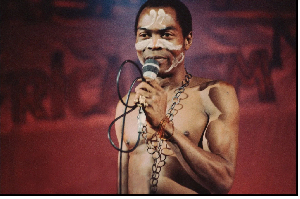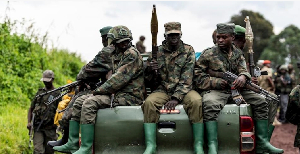G.I.J is 50 and students are excited, as are their lecturers and others who make up the institute. The enthusiastic manner in which both students and staff of the institute participated in the ‘float and health walk’-one of the numerous programmes lined up for the celebrations- epitomises the preceding observation. One could hardly differentiate lecturers from students as the former passionately displayed impeccable dancing skills totalling outdoing their students in spite of their age and status, as they ‘floated’ blissfully round the capital.
G.I.J, definitely, has cause to celebrate. This is an institute that has produced over eighty percent of practicing journalists in Ghana today. Many Public Relations practitioners as well as social science lecturers were trained by the institute. Many other professionals have had their dreams shaped by the institute. During the launch of G.I.J @ 50 a couple of months ago, the General Manager of the Daily Graphic affirmed that over eighty percent of workers at the Daily Graphic are products of G.I.J. This only goes a long way to show how far the institute has come.
The preceding observations notwithstanding, it ought to be acknowledged that G.I.J has failed to live up to its full potential. G.I.J’s 50th anniversary celebrations almost coincided with Kwame Nkrumah’s centenary celebrations. I doubt, however, if the highly esteemed ‘founder of the Ghanaian nation’ will be proud, were he alive today, of the institute’s achievements after fifty years of existence. The G.I.J we have today is definitely not what Nkrumah envisioned. He had envisaged an institute that would produce world class journalists comparable to the best in the world; journalists who would contribute towards national development and not derail it. It is no longer news that journalistic standards in this country have fallen to a pathetic level as affirmed by Dr. Nii Moi Thompson in ‘Whither Ghanaian Journalism?’ Other well-meaning Ghanaians, also, have affirmed this on countless occasions. G.I.J, definitely, should take part of the blame for poor journalistic standards considering the fact that it produces most of the journalists in the country. One, however, cannot blame the institute because it is probably the most deprived government owned university in Africa with regards to infrastructural facilities and educational equipment. Fifty years old G.I.J has no hostel facility, so students have to commute from their homes to school on a daily basis; some from places as far as Kasoa and Tema. Those who are ‘unfortunate’ to be living outside Accra are obliged to get themselves private hostels where they pay as much as five hundred cedis per semester.
There is also the problem of inadequate lecture halls, a situation which perpetually prevents the school administration from admitting more students and thereby substantially increasing the institute’s internally generated funds.
G.I.J is a journalism school, and journalism just like medicine is basically a practical course. The institute, however, lacks some basic equipment and facilities needed for practical journalism. G.I.J is probably the only communication institute in the world that lacks a radio station which is an imperative in the training of would-be broadcasters. If even institutions such as the University of Ghana, and the University of Education Winneba-Kumasi Campus, and other universities that are not basically into communication have radio stations which they continually use to reach out to people, what prevents the G.I.J whose motto is ‘promoting communication excellence’, from owning one?
With regards to print journalism, the institute’s students’ publications-Life Style, Communicator, PR Today- are published only once in a year. This, ostensibly, is due to lack of commitment on the part of students and administration. The latter seems fed up with publishing the aforementioned publications due to the high cost involved. As a result, students graduate from the institute lacking basic skills in practical journalism. Attachments, without a doubt, are meant to provide students with some form of practical training. In G.I.J, however, the process of designating students to the various media houses is fundamentally flawed. There is no segmentation whatsoever to find out where each student would best perform on the broad media landscape. So if a student who aspires to be a disc jockey is attached to newspaper to write features and new stories, nothing is achieved at the end of the day.
In today’s world of astonishing technological advancement, I.C.T has become an inextricable part of our lives; therefore at fifty, not only should the G.I.J be able to provide students with hundreds of internet connected computers, it should also possess an internet portal comparable to the likes of Ghanaweb, Modern Ghana, and My joy online, where the public can easily access information written and edited by students. The ten or so computers meant for approximately one thousand G.I.J students is woefully inadequate; it is pathetic for an institute that prides itself as West Africa’s premier communication institute.
Last week, G.I.J was presented with a Presidential Charter that made her autonomous and a fully fledged university, thus empowering her to begin issuing her own certificates. This, though a wonderful development, has been long overdue. It shouldn’t have taken the institute fifty years to get this far.
The problems confronting the G.I.J, truth be told, are numerous and cannot be delineated coherently in a three-page article. However, these are a few of the institute’s most pressing problems.
G.I.J’s problems can be attributed to years of stark insensitivity on the part of the government to the plight of the institute. The government has failed in its duty of providing the institute with much needed infrastructure and other educational facilities. A few years ago, the institute purchased a piece of land for the purpose of building a new site; years on, that land still lies useless with development work yet to begin on it. With regards to equipment and facilities required for practical journalism, government has done virtually nothing for the G.I.J, relative to what it has done for institutions such as the U.C.C, K.N.U.S.T, and even Accra Polytechnic. When the Open Society Initiative for West Africa (OSIWA), a non-governmental organization realized that the G.I.J needed a radio equipment to facilitate practical training in broadcast journalism, it benevolently donated one her. When the equipment arrived at the Tema harbour however, it was impounded by the National Communications Authority. In justifying its action, the N.C.A explained that the F.M equipment was too sophisticated to be used for educational purposes. All efforts made by the school administration to retrieve the equipment have been futile. Isn’t it ironic that the government which hitherto, had either been incapable of or uninterested in providing G.I.J with a radio equipment, would for vague and incomprehensible reasons impound one that had been donated by a benevolent and sensitive NGO, thereby depriving hundreds of students the opportunity to amass invaluable experience in broadcast journalism?
The Ghanaian media, also, has been highly unfair to the G.I.J; it is disheartening to note that journalists who at one point or the other, defied equally enormous difficulties at G.I.J and are supposed to radically agitate for change for the institute using their various mediums, have turned their backs on the institute. Apparently, they forgot about the institute the very day they received their certificates. Isn’t it pathetic that an institution that has produced majority of journalists in Ghana today lacks hostel facilities, even after five decades of existence?
Though the school administration deserves praise for providing G.I.J with some of the best lecturers in the world, it certainly hasn’t done enough to help the institute attain some form of infrastructural development. If it had drawn up a coherent developmental plan over the years and set aside at least ten percent of its internally generated revenue for developmental purposes, by now the institute wouldn’t be in dire need of certain basic infrastructural facilities such as lecture halls and hostels.
K.N.U.S.T and U.C.C, just like G.I.J, were founded by Nkrumah after independence. K.N.U.S.T, now with an approximate population of twenty-five thousand, was founded basically to train students in science and technology; it has, however, diversified and is now producing graduates in Law, Accounting, English Language, African Studies and even Fine-Arts. The College of arts and social studies is the largest in the K.N.U.S.T with a population of over seven thousand students; and this is an institution that was originally founded for science and technology only.
U.C.C on the other hand was founded basically for training teachers; today, however, she produces doctors, engineers, bankers, lawyers, journalists, and many more. Accra poly was founded in 1993; today she has adequate infrastructure-lecture halls, hostels, etc- and a student population that is almost ten times bigger than the G.I.J; and this is an institution that is thirty- four years younger than the G.I.J!
It is within the context of the forgoing observations that the failure of the G.I.J over the past fifty years should be analyzed. It is evident that the G.I.J has failed to live up to its potential and G.I.J @50 is an opportunity to reflect soberly.
The institute must end its obsession about ‘having produced most of the journalists in Ghana today, (some of these journalists have been referred to as incompetent by highly esteemed intellectuals such as Dr. Nii Moi Thompson, anyway) and go back to the drawing board.
The school administration must come up with a coherent developmental strategy that will see the institute develop with or without government’s assistance. This isn’t impossible in this modern world of industrialization where companies are struggling to outdo one another by way of sponsorship and social responsibility. Good journalism in Ghana today depends on a number of factors including the success of West Africa’s Premier communication Institute- G.I.J- which continues to produce most of the journalists in Ghana today. Therefore, if the institute continues to be neglected, as the case is now, aspiring journalists will continue to lack proper training; the unquestionable consequence of that is that journalistic standards in the country will continue to fall effortlessly. It is imperative, therefore, that all stake holders, more so the government, play their part in ensuring that the institute is well supported and resourced. The school administration on its part, should come up with a coherent developmental plan that would not only see the institution relocate to its new site, but will also see her diversify and begin awarding degrees for courses such as English Language, Political Science, Philosophy, African Studies, sociology, and other social sciences, just like U.C.C and K.N.U.S.T have done. Needless to say, the G.I.J shouldn’t wait until she is hundred before beginning to award Masters Degrees in Communication Studies.
Samuel K. Obour Samuelkwason@yahoo.com The Author is studying Communication Studies at the Ghana Institute of Journalism.
Opinions of Friday, 23 October 2009
Columnist: Obour, Samuel K.














